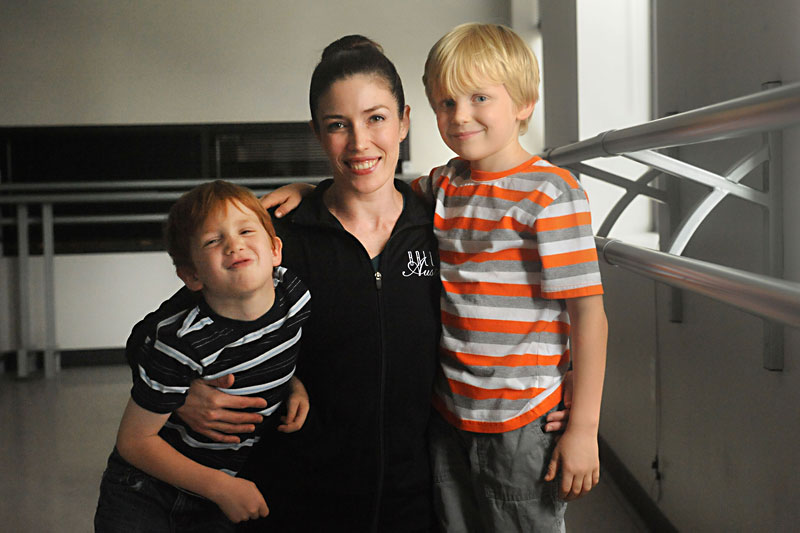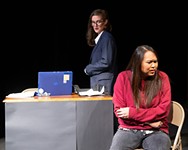Art or Parenting?
Four professional artists discuss how having kids has affected their careers and ways of working
By Elizabeth Cobbe, Fri., Oct. 30, 2015
Curious things happen as one grows a bit older in this creative town. One of them is the rapid shrinking of one's peer group at work in the arts. The reality of trying to live a life that involves things like marriage, children, and a solid roof can often lead artists to choose new paths in life. Of those who remain in their creative profession, plenty live full lives without children, either by choice or by circumstance.
The artists who continue to work at a professional level while raising a family make up a curious overlap between the world of child-rearing and the world of studios and rehearsals. In some ways, they resemble any other family with parents who work outside the home: busy and bummed about the cost of child care. As artists, they encounter unique experiences in the face of divided priorities.
I pulled off the Herculean task of getting four of these working artist-parents into one room at the same time on a weekday afternoon: Aara Krumpe, professional dancer at Ballet Austin for 17 years, and wife and mother to two boys, ages 5 and 7; Shea Little, director of Big Medium, artistic dabbler, and married father of three; Kirk Lynn, head of the playwriting/directing program at the University of Texas, author, co-producing artistic director of the Rude Mechanicals, and husband and father of two; and C. Denby Swanson, a playwright, writer, member of Southwestern University's theatre department, and single mom to a 3-year-old boy.
I delayed picking up my pinkeye-stricken child from daycare for an hour (Sorry, sweetie!) so we could talk about how to make it work as a parent and as a professional artist in Austin.
Austin Chronicle: How has having a family impacted your professional life as an artist?
Kirk Lynn: I think it's stressed out my theatre collective because I want to travel less, but also, opportunities have come up that when I look at the calendar and the stress it's going to put on my wife and my kids and myself and my writing time, I just say, "No more."
Shea Little: Very much the same, just having to say no. Now as an arts administrator, it's very different. I've learned to do the nine-to-five thing, instead of nine to midnight and back again the next day.
C. Denby Swanson: And 2am to 6am.
Little: Right. But then as an artist, having kids has definitely – I don't want to say it killed the artist in me, but it's definitely strangled the ability for me to be creative.
AC: Is that because of time?
Little: Yeah. I also made a very clear decision at some point [that] I need to focus on work and to see that as an ability for me to express that creative side of me. And embracing it for now, because in the future, I know that I will have a chance to do more of my own art.

Aara Krumpe: That's interesting, because I am at a point where my body will only last about five more years max. I have a very limited career time.
I think having kids has made me a much better artist. I look at things in different ballets and different roles with a better perspective. I'm able to really be efficient with my time.
Swanson: I actually gave up writing for several years in order to become a parent. The writing life and depending on grants and all the instability of that world was prohibitive, and I was reaching the point where I couldn't have kids biologically. I decided to stop writing and focus exclusively on a day job that was dependable and financially stable so I could become a parent. And I adopted my son in 2014.
Lynn: In my time in Austin, I started as somebody who was very funny and very clever but didn't have a lot of depth, and then found more depth in my life through my relationship with my wife and through having kids.
I'm interested in you just feeling like, "I have to have a kid some way. I'll just change everything to have a kid."
Swanson: Right. I felt like writing was getting in the way of that. So I was thrilled to give up writing if it meant that I could have a family.
AC: How have you managed to take time away and come back? Especially Aara, as a dancer. Physically, how do you take that time away and come back with a different physical identity to the work that you do?
Krumpe: It was very difficult. I think the hardest thing was when I was pregnant. I still did Nutcracker at 13, 14 weeks, which was interesting. But then I had to leave the stage. It was very difficult to not be working in that way. Then I had to plan my pregnancies to deliver in the summer so that I was able to come back. With [my older son] Leo, I came back after eight weeks, because you have something to prove. I was lucky that it worked out and I was able to do that.
[Interruption in which the reporter receives a call from the pediatrician about pinkeye.]
Lynn: That's great – the subtext of this entire event is a working mother who's dealing with pinkeye.
AC: Thank you for that. So for those who have either stepped back or taken time away, how do you come back?
Little: Kids haven't killed it, but they make it so hard. I don't want to sound negative, because I would never pass up on having this experience, ever. But it makes it a lot harder to do the things you may have wanted to do prior to knowing what it means to have kids.
Swanson: Yeah. I think it's a question for me of want. Because I knew I wanted to be a parent so much, so badly, I would rather do things with my kids than anything else. So doing something artistically has to be because I want to. There's just no suffering about it, which was I think a big part of my writing practice for an embarrassingly long time. Ten years was probably me suffering as a writer. Purposefully! I knew I was suffering! And I kept suffering, and I chose situations in which I suffered more –
Lynn: And then you gave it up to be a parent! You're just looking for the most suffering you can find.
Swanson: Except that it's joyful suffering. Even at three in the morning. The struggle is so difficult to get there, and then you're like, this is exactly what I wanted. I am so fortunate to be able to be up at three in the morning feeding my child.
Krumpe: The most eye-opening experience for me was when I came back to work, and I would walk into the studio and see all these dancers doing everything on the exact same count, and I was just in awe of everyone. Before I had a kid, I was known for being a little too intense in the studio. It was very interesting to see my peers, to see how my relationship with them changed because I was just in awe of what we could do as humans.
Swanson: Did watching your son's body develop, how he learned to walk, and standing up for the first time –
Krumpe: Yes! We're creating ballets! It was very interesting to see that phase and then the toddler phase and, you know, the little people that they are right now.
AC: How does your work impact what you do as a parent?
Krumpe: I think it's fun to see [my kids] start to get that I still go in and do what I do, even in the summers when we're off, because I love it. I hope that they can find something on their own that can turn into a profession.
Lynn: Olive, our older, loves to dance, and we make dances all the time, and they're pretty insane and very theatrical. When she came into the actual theatre and saw the space with the chairs set up, the literal sentence she said to me was, "This place is perfect, Dad. We can do our dances here." It's nice to see it through your daughter's eyes and see, yeah, this space is perfect.
Little: What the kids do has informed those things in the back of my head like – ooh, when I start making more stuff, I'm gonna look at these things and think about stuff differently, because of the way the kids think and doodle and paint and make stuff.
AC: What support system have you built around yourselves to make it possible to maintain both career and family? Or are you just doing it all yourselves?
Swanson: When I was first parenting, I was a foster mom for a while. My first foster child didn't eat, sleep, or talk when he first showed up. He was traumatized. So I had a schedule every 15 minutes. All day long, same schedule every single day. As long as we stuck to that, things went smoothly. And that's stayed with me with my son that I adopted. That schedule is king, and everything else is kind of secondary. I don't get out. I don't see stuff a lot. I'm single parenting, so there's nobody to leave him with.
Krumpe: Both of my kids have been in full-time preschool since they were 8 weeks old. You just have to rely on that, and if they get sick, call my husband, pull a straw, who's going to go get them?
Swanson: Such as pinkeye?
Krumpe: Yes, pinkeye. We both value what we do. It's difficult deciding who's going to go and get the kid. You have to rehearse. You can't just not come if you're one of the leads.
Lynn: I would be remiss if I didn't mention my wife who is also a writer. Both of us want quiet time. But then so much of my time is also rehearsal, which is more complicated. And talk about support. I get to take up more oxygen right now in the relationship, because theatre takes rehearsal. That's a gift.
Little: I would say the same thing. Because of the nine-to-five structure and having staff, it feels like my thing has to trump whatever my wife is doing. Maybe that is the male-female relationship as well, where there's an expectation that the wife will help out when they get the pinkeye call. My wife is just a huge part of that support structure.
AC: Financially, how have you guys made everything come together?
Lynn: The Rude Mechs are never gonna pay me what UT pays me, so I had to change my life to get this amount of money. Once I had kids, I was like, I need X amount of money, and I need it today. And got very aggressive about money. I gather up everybody's money, and I put it in our bank account! That's my job in some ways.
Krumpe: That was part of the idea of planning as best we could to have my kid in the summer so I could come back. When I came back after my second son, all of a sudden, there was a pregnancy policy. Which was good! It needed to be done. [Ballet Austin] is very good about trying to make it work. But before that policy, I didn't know what was going on. So I had to be back! Just to make it work. And daycare is expensive. I'm not having a third kid because I think I'm too old now to come back appropriately, but when you're paying $1,800 a month in daycare, it's just ridiculous.
AC: Is Ballet Austin's policy toward pregnant dancers something that is common among repertory companies?
Krumpe: I feel like the dance world has changed drastically over the past 20 years. If you look at other companies nationally, there are a lot more moms that are continuing with their careers after they have kids, which is wonderful. I remember when I was in high school, that wasn't the case. We have such a short amount of time. Sometimes you don't even know if you can have kids, so it's difficult. You want to make sure you get it all in, but it's hard to give up your career. And what your body goes through.
AC: What advice would you give to gifted artists who are starting their careers and someday want to fit a family life into that picture?
Little: My advice is, don't plan too much. Don't try to have kids at this age, and don't try to be at this stage in your career. I know as women it's a lot harder to say those things, if you have certain things that you and your body are doing. But for my wife and I, we had kids at a horrible time, but it was the right time. That's when we as people decide to have kids. So just be open to it and accept it and allow your career to adapt.
Krumpe: Exactly. There's never a good time to have kids. It's very difficult to plan it. But it is very possible to have it all happen.
With me, I was told, "You have this medical problem. It's either now or possibly never." It was a wake-up call. I was just starting to get principal roles. But my husband wanted a family, so let's just do it. We'll see if I come back to principal roles. I was so lucky that I did. But you just don't know. There's never a good time. You just have to do it and go along for the ride.
Lynn: I think it's a lot like art, there's not a right way to do it. You just do your best, and as long as you can keep developing that consciousness of, "Am I doing my best today? No. I'll try harder. I'll keep engaging with this ongoing project that has no real end and has no real purpose but love or whatever it is." It's terrifying.
Swanson: It's always terrifying. I think we all have limited resources. I made a choice about becoming financially stable, and I was able to make that choice. But I also knew that if I made that choice, I knew that other things were going to be left behind.
Women have a much more specifically limited biology then most men do. You do have to make a choice at some point. All of us do about various things. You just gotta decide what you want. And then figure out some way if you can to make it happen.
Krumpe: And people should assume that it can happen. It is possible.
For more of this discussion, visit austinchronicle.com/daily/arts.











